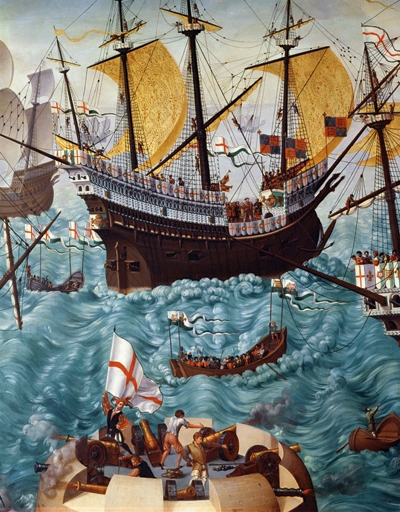‘I never before came across a man whom I could fancy being a Napoleon or a Nelson…His ascendancy over everybody is quite curious: the extent to which every officer and man feels the slightest praise or rebuke would have been before seeing him incomprehensible.’ Thus wrote the 22-year-old Charles Darwin of Robert Fitzroy, the 26-year-old captain of the Beagle, a good but not unusual example of captains during the Royal Navy’s zenith in the decades following Trafalgar.
Part of the value of Ben Wilson’s excellent account is that he shows how exceptional those decades of nautical dominance were during the long run of Britain’s relations with the troubled seas around her coasts; also, how our present diminished state has brought us back full circle to our period of greatest naval weakness in the Middle Ages.
During Saxon and Viking times the sea was the threat to these islands rather than its defence, as we later came to think. Invaders could appear without warning at almost any point on our long coastline, while the many estuaries and rivers were perfect inroads. Alfred the Great, most successful of Saxon kings in resisting Viking incursions, built a small fleet and is sometimes credited with being the father of the navy, but in fact the role of ships in his campaigns was very limited. It is more credible, Wilson argues, to consider him father of the idea of England.
Naval paternity might more accurately be attributed to Henry VIII whose 54 ships with permanent logistical support and a network of coastal forts constituted a recognisably modern navy. Despite this, Britain remained nautically backward compared with other nations in terms of shipbuilding, seaborne exploration and the ability to project force far beyond these shores. For centuries, too, there were very blurred lines between royal service, trading, privateering and privacy. Outstanding individuals such as Hawkings, Drake and Raleigh were the high-achieving exceptions that created tradition — or belief in tradition, which amounted to the same thing.
It was Admiral Anson’s reforms in the 18th century that created the conditions for subsequent naval supremacy. He took on endemic corruption, inefficiency, indiscipline and neglect, as well as a cultural antipathy that has something of a modern ring: ‘Verdicts for courts martial for cowardice or disobeying orders in the 1740s were undone by civilian courts and politicians,’ notes Wilson. The cultural changes wrought by Anson were most famously, or notoriously, exemplified by the shooting of Admiral Byng for having neglected to press home an attack against the French. As Voltaire observed, this harsh judgment served to ‘encourage the others’, with the result that for the next two centuries the Royal Navy was as feared for its aggression as it was respected for the fact that its captains took responsibility for failure (arguably, in fact, until 2007 when both traditions appear to have been forgotten in an afternoon, following the ignominious seizure of an RN vessel and crew in the Persian Gulf).
Aggression was not, of course, in short supply at Trafalgar when Collingwood, locked yardarm to yardarm with his prey and eating an apple amidst fearsome cannonades, could exclaim, ‘What would Nelson give to be here!’ There are doubtless more accounts of Trafalgar than ships in the action but Wilson’s has the virtues of concision and clarity, while rightly emphasising the roles of training, gunnery, initiative and discipline. As Villeneueve, the talented French admiral conceded, ‘To any other nation the loss of Nelson would have been irreparable, but in the British fleet off Cadiz, every captain was a Nelson.’ Wilson also makes comparisons which illuminate the power and technological pre-eminence of warships in those days. Victory alone carried armaments equivalent to 67 per cent of Wellington’s artillery.
It is said that anyone who studies Jutland — the hoped-for Trafalgar of the 20th century — emerges as a Beatty man or a Jellicoe man. Either you plump for the dash and boldness of the charismatic battle-cruiser commander, accepting his carelessness and lack of preparation as the other side of the coin, or you go for the rigour and method of the Grand Fleet commander, excusing his caution on the grounds that he was, as Churchill said, the only man who could lose the war in an afternoon.
Wilson is clearly a Jellicoe man, and it is hard to disagree; Beatty’s Nelsonic aggression was admirable but his neglect of Nelsonic planning, preparation and training should have seen him sacked rather than promoted. As Wilson says, ‘Both sides managed to lose the Battle of Jutland.’
The Royal Navy was not prominent in the 2012 Diamond Jubilee because there’s so little of it. Weaker now than for centuries (and about to get weaker still if the Lib Dems have their way with the nuclear deterrent), it could probably protect the Isle of Wight from occupation but would struggle with the rest of the country and certainly couldn’t be replaced from non-existent British shipyards. Even so, Wilson concludes that ‘Never has Britain been so strong at sea’ — not because we have the power to defend our interests but because, post-Cold War, there is no serious seaborne threat. For now. ‘The need for a navy will never go away,’ he reminds us. ‘History has not finished with us.’
That is certainly true. Selfishly, meanwhile, my only regret was in finishing this fascinating and thought-provoking account.






Comments